Sainsbury's Audit Committee: Detecting Fraud in a Corporate Setting
VerifiedAdded on 2023/01/13
|11
|3338
|32
Report
AI Summary
This report examines the critical role of audit committees in detecting fraud within large corporate houses, focusing on Sainsbury's as a case study. The introduction highlights the importance of audits in verifying organizational practices, detecting fraud, and ensuring operational efficiency. The rationale emphasizes the study's aim to demonstrate the significance of auditing and provide insights into how companies can enhance their profitability by preventing fraud. The literature review explores debates related to the problem, specific debates, and thematic reviews, including the concept of audits, factors determining the success of an audit committee, and the challenges Sainsbury's faces. The research methodology outlines the application of positivism philosophy, a quantitative and deductive research approach, and a descriptive research design, employing surveys for data collection. The report concludes by summarizing the importance of audit committees in enhancing financial statement effectiveness and the challenges organizations face in fraud detection. The report also discusses the research methodology employed, including the research philosophy, approach, strategy, and design used to gather and analyze data related to the role of audit committees in detecting fraud.
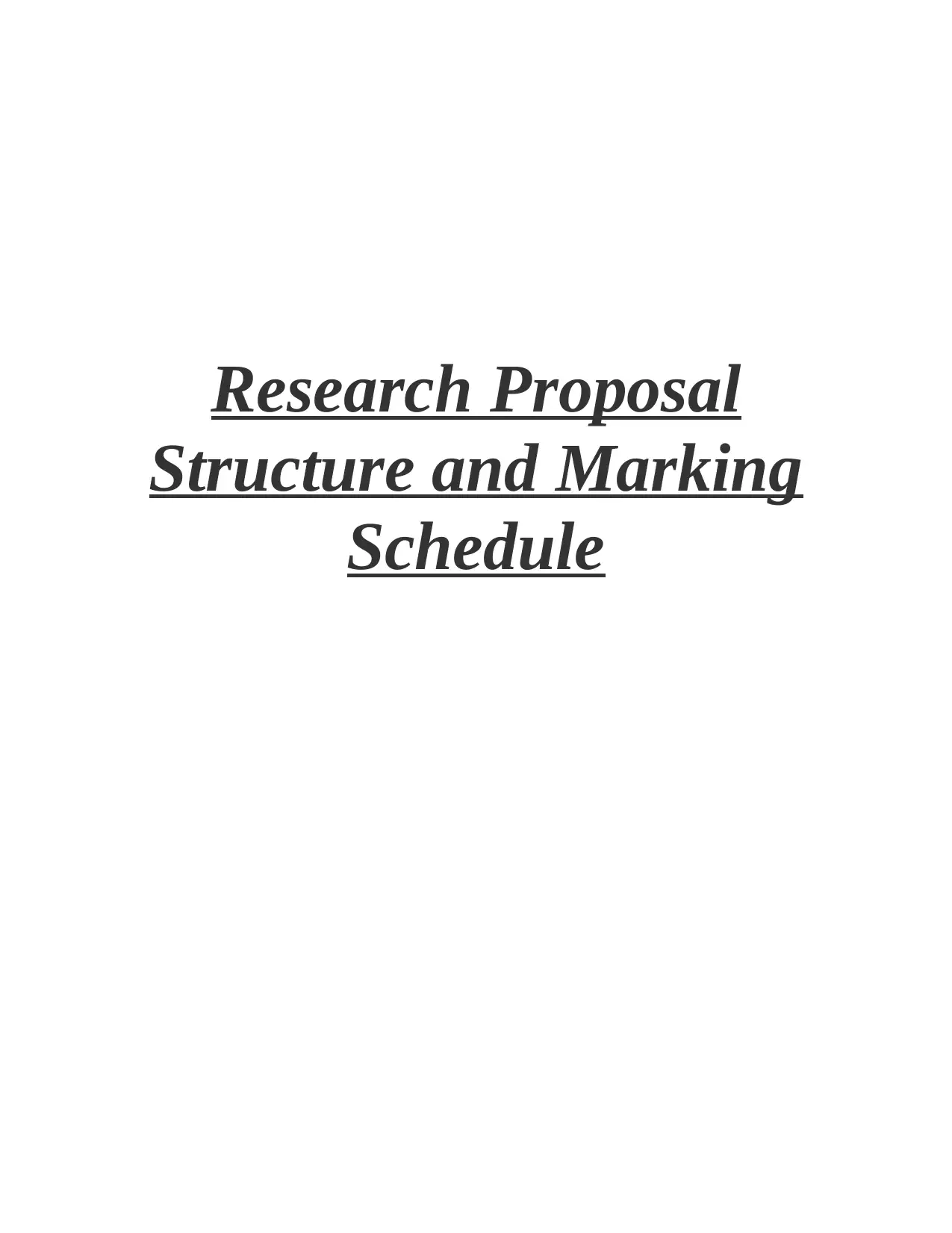
Research Proposal
Structure and Marking
Schedule
Structure and Marking
Schedule
Paraphrase This Document
Need a fresh take? Get an instant paraphrase of this document with our AI Paraphraser
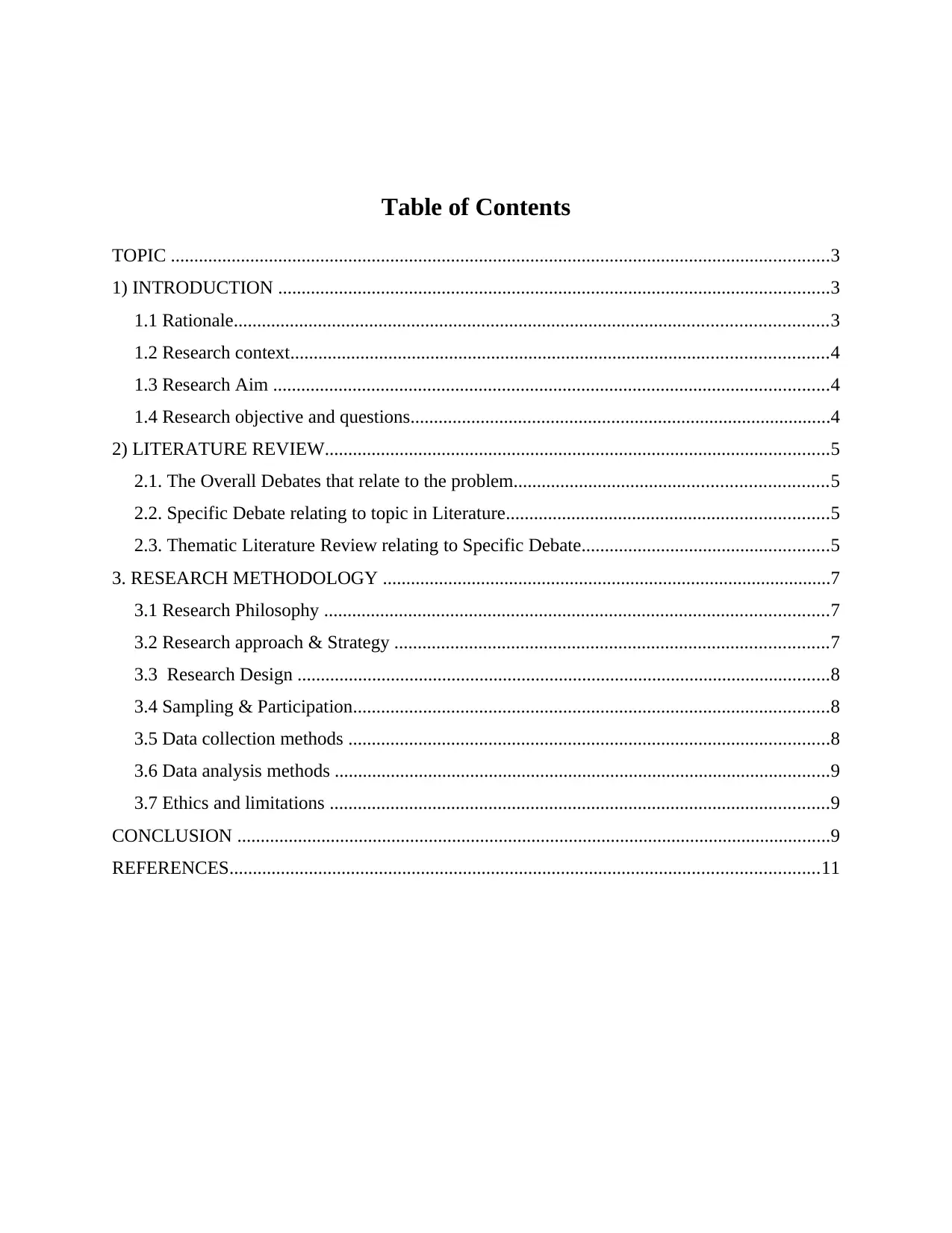
Table of Contents
TOPIC .............................................................................................................................................3
1) INTRODUCTION ......................................................................................................................3
1.1 Rationale...............................................................................................................................3
1.2 Research context...................................................................................................................4
1.3 Research Aim .......................................................................................................................4
1.4 Research objective and questions..........................................................................................4
2) LITERATURE REVIEW............................................................................................................5
2.1. The Overall Debates that relate to the problem...................................................................5
2.2. Specific Debate relating to topic in Literature.....................................................................5
2.3. Thematic Literature Review relating to Specific Debate.....................................................5
3. RESEARCH METHODOLOGY ................................................................................................7
3.1 Research Philosophy ............................................................................................................7
3.2 Research approach & Strategy .............................................................................................7
3.3 Research Design ..................................................................................................................8
3.4 Sampling & Participation......................................................................................................8
3.5 Data collection methods .......................................................................................................8
3.6 Data analysis methods ..........................................................................................................9
3.7 Ethics and limitations ...........................................................................................................9
CONCLUSION ...............................................................................................................................9
REFERENCES..............................................................................................................................11
TOPIC .............................................................................................................................................3
1) INTRODUCTION ......................................................................................................................3
1.1 Rationale...............................................................................................................................3
1.2 Research context...................................................................................................................4
1.3 Research Aim .......................................................................................................................4
1.4 Research objective and questions..........................................................................................4
2) LITERATURE REVIEW............................................................................................................5
2.1. The Overall Debates that relate to the problem...................................................................5
2.2. Specific Debate relating to topic in Literature.....................................................................5
2.3. Thematic Literature Review relating to Specific Debate.....................................................5
3. RESEARCH METHODOLOGY ................................................................................................7
3.1 Research Philosophy ............................................................................................................7
3.2 Research approach & Strategy .............................................................................................7
3.3 Research Design ..................................................................................................................8
3.4 Sampling & Participation......................................................................................................8
3.5 Data collection methods .......................................................................................................8
3.6 Data analysis methods ..........................................................................................................9
3.7 Ethics and limitations ...........................................................................................................9
CONCLUSION ...............................................................................................................................9
REFERENCES..............................................................................................................................11
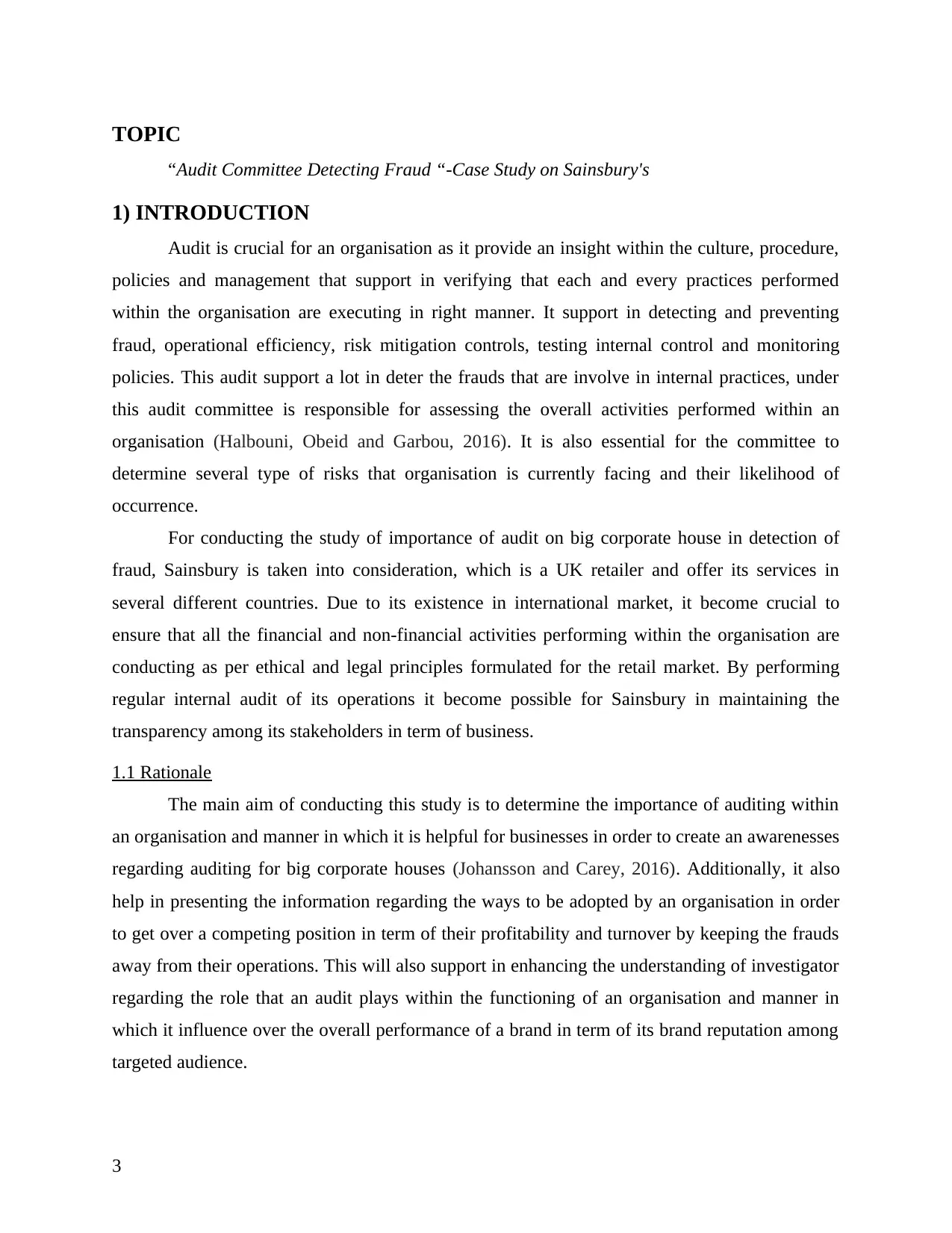
TOPIC
“Audit Committee Detecting Fraud “-Case Study on Sainsbury's
1) INTRODUCTION
Audit is crucial for an organisation as it provide an insight within the culture, procedure,
policies and management that support in verifying that each and every practices performed
within the organisation are executing in right manner. It support in detecting and preventing
fraud, operational efficiency, risk mitigation controls, testing internal control and monitoring
policies. This audit support a lot in deter the frauds that are involve in internal practices, under
this audit committee is responsible for assessing the overall activities performed within an
organisation (Halbouni, Obeid and Garbou, 2016). It is also essential for the committee to
determine several type of risks that organisation is currently facing and their likelihood of
occurrence.
For conducting the study of importance of audit on big corporate house in detection of
fraud, Sainsbury is taken into consideration, which is a UK retailer and offer its services in
several different countries. Due to its existence in international market, it become crucial to
ensure that all the financial and non-financial activities performing within the organisation are
conducting as per ethical and legal principles formulated for the retail market. By performing
regular internal audit of its operations it become possible for Sainsbury in maintaining the
transparency among its stakeholders in term of business.
1.1 Rationale
The main aim of conducting this study is to determine the importance of auditing within
an organisation and manner in which it is helpful for businesses in order to create an awarenesses
regarding auditing for big corporate houses (Johansson and Carey, 2016). Additionally, it also
help in presenting the information regarding the ways to be adopted by an organisation in order
to get over a competing position in term of their profitability and turnover by keeping the frauds
away from their operations. This will also support in enhancing the understanding of investigator
regarding the role that an audit plays within the functioning of an organisation and manner in
which it influence over the overall performance of a brand in term of its brand reputation among
targeted audience.
3
“Audit Committee Detecting Fraud “-Case Study on Sainsbury's
1) INTRODUCTION
Audit is crucial for an organisation as it provide an insight within the culture, procedure,
policies and management that support in verifying that each and every practices performed
within the organisation are executing in right manner. It support in detecting and preventing
fraud, operational efficiency, risk mitigation controls, testing internal control and monitoring
policies. This audit support a lot in deter the frauds that are involve in internal practices, under
this audit committee is responsible for assessing the overall activities performed within an
organisation (Halbouni, Obeid and Garbou, 2016). It is also essential for the committee to
determine several type of risks that organisation is currently facing and their likelihood of
occurrence.
For conducting the study of importance of audit on big corporate house in detection of
fraud, Sainsbury is taken into consideration, which is a UK retailer and offer its services in
several different countries. Due to its existence in international market, it become crucial to
ensure that all the financial and non-financial activities performing within the organisation are
conducting as per ethical and legal principles formulated for the retail market. By performing
regular internal audit of its operations it become possible for Sainsbury in maintaining the
transparency among its stakeholders in term of business.
1.1 Rationale
The main aim of conducting this study is to determine the importance of auditing within
an organisation and manner in which it is helpful for businesses in order to create an awarenesses
regarding auditing for big corporate houses (Johansson and Carey, 2016). Additionally, it also
help in presenting the information regarding the ways to be adopted by an organisation in order
to get over a competing position in term of their profitability and turnover by keeping the frauds
away from their operations. This will also support in enhancing the understanding of investigator
regarding the role that an audit plays within the functioning of an organisation and manner in
which it influence over the overall performance of a brand in term of its brand reputation among
targeted audience.
3
⊘ This is a preview!⊘
Do you want full access?
Subscribe today to unlock all pages.

Trusted by 1+ million students worldwide
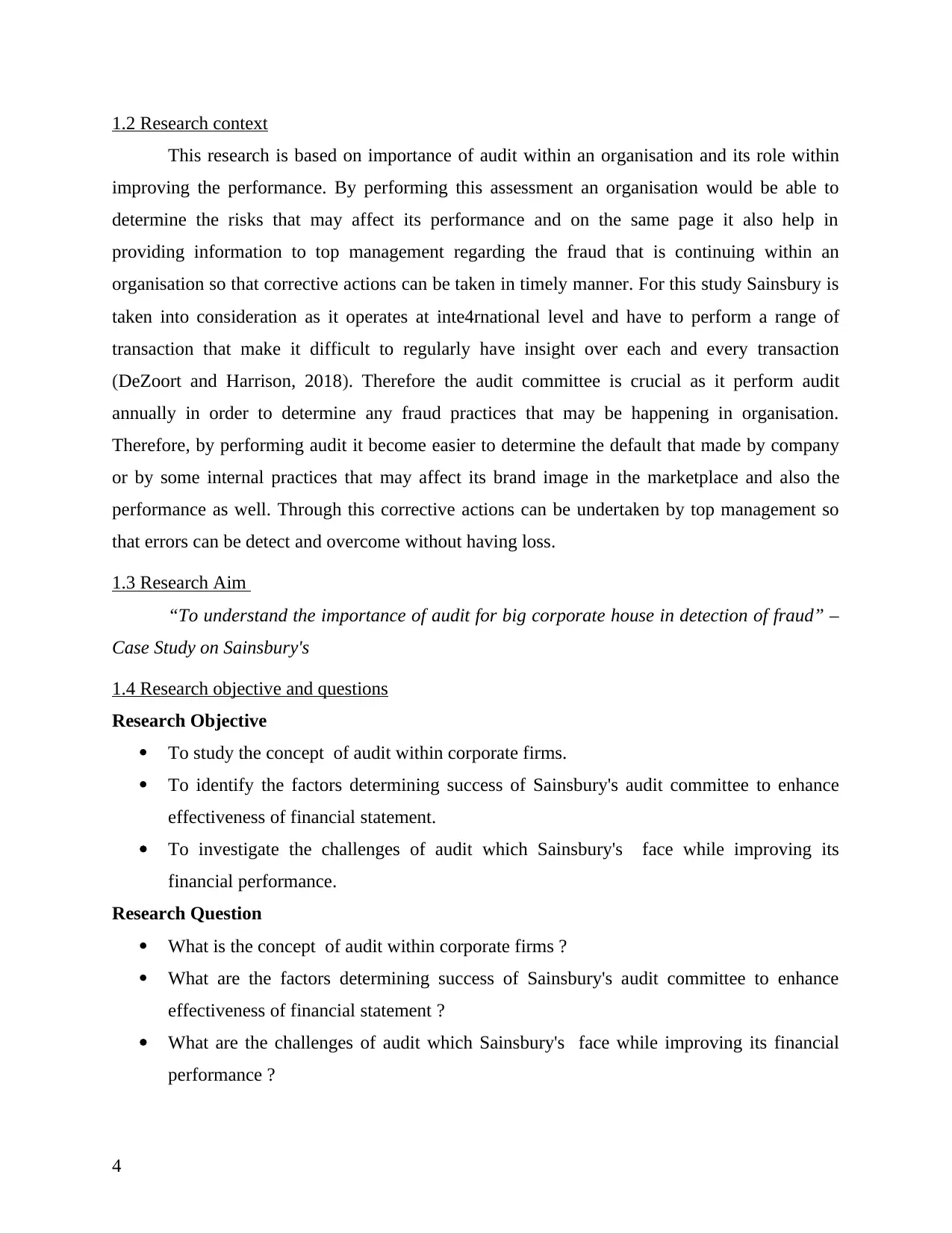
1.2 Research context
This research is based on importance of audit within an organisation and its role within
improving the performance. By performing this assessment an organisation would be able to
determine the risks that may affect its performance and on the same page it also help in
providing information to top management regarding the fraud that is continuing within an
organisation so that corrective actions can be taken in timely manner. For this study Sainsbury is
taken into consideration as it operates at inte4rnational level and have to perform a range of
transaction that make it difficult to regularly have insight over each and every transaction
(DeZoort and Harrison, 2018). Therefore the audit committee is crucial as it perform audit
annually in order to determine any fraud practices that may be happening in organisation.
Therefore, by performing audit it become easier to determine the default that made by company
or by some internal practices that may affect its brand image in the marketplace and also the
performance as well. Through this corrective actions can be undertaken by top management so
that errors can be detect and overcome without having loss.
1.3 Research Aim
“To understand the importance of audit for big corporate house in detection of fraud” –
Case Study on Sainsbury's
1.4 Research objective and questions
Research Objective
To study the concept of audit within corporate firms.
To identify the factors determining success of Sainsbury's audit committee to enhance
effectiveness of financial statement.
To investigate the challenges of audit which Sainsbury's face while improving its
financial performance.
Research Question
What is the concept of audit within corporate firms ?
What are the factors determining success of Sainsbury's audit committee to enhance
effectiveness of financial statement ?
What are the challenges of audit which Sainsbury's face while improving its financial
performance ?
4
This research is based on importance of audit within an organisation and its role within
improving the performance. By performing this assessment an organisation would be able to
determine the risks that may affect its performance and on the same page it also help in
providing information to top management regarding the fraud that is continuing within an
organisation so that corrective actions can be taken in timely manner. For this study Sainsbury is
taken into consideration as it operates at inte4rnational level and have to perform a range of
transaction that make it difficult to regularly have insight over each and every transaction
(DeZoort and Harrison, 2018). Therefore the audit committee is crucial as it perform audit
annually in order to determine any fraud practices that may be happening in organisation.
Therefore, by performing audit it become easier to determine the default that made by company
or by some internal practices that may affect its brand image in the marketplace and also the
performance as well. Through this corrective actions can be undertaken by top management so
that errors can be detect and overcome without having loss.
1.3 Research Aim
“To understand the importance of audit for big corporate house in detection of fraud” –
Case Study on Sainsbury's
1.4 Research objective and questions
Research Objective
To study the concept of audit within corporate firms.
To identify the factors determining success of Sainsbury's audit committee to enhance
effectiveness of financial statement.
To investigate the challenges of audit which Sainsbury's face while improving its
financial performance.
Research Question
What is the concept of audit within corporate firms ?
What are the factors determining success of Sainsbury's audit committee to enhance
effectiveness of financial statement ?
What are the challenges of audit which Sainsbury's face while improving its financial
performance ?
4
Paraphrase This Document
Need a fresh take? Get an instant paraphrase of this document with our AI Paraphraser
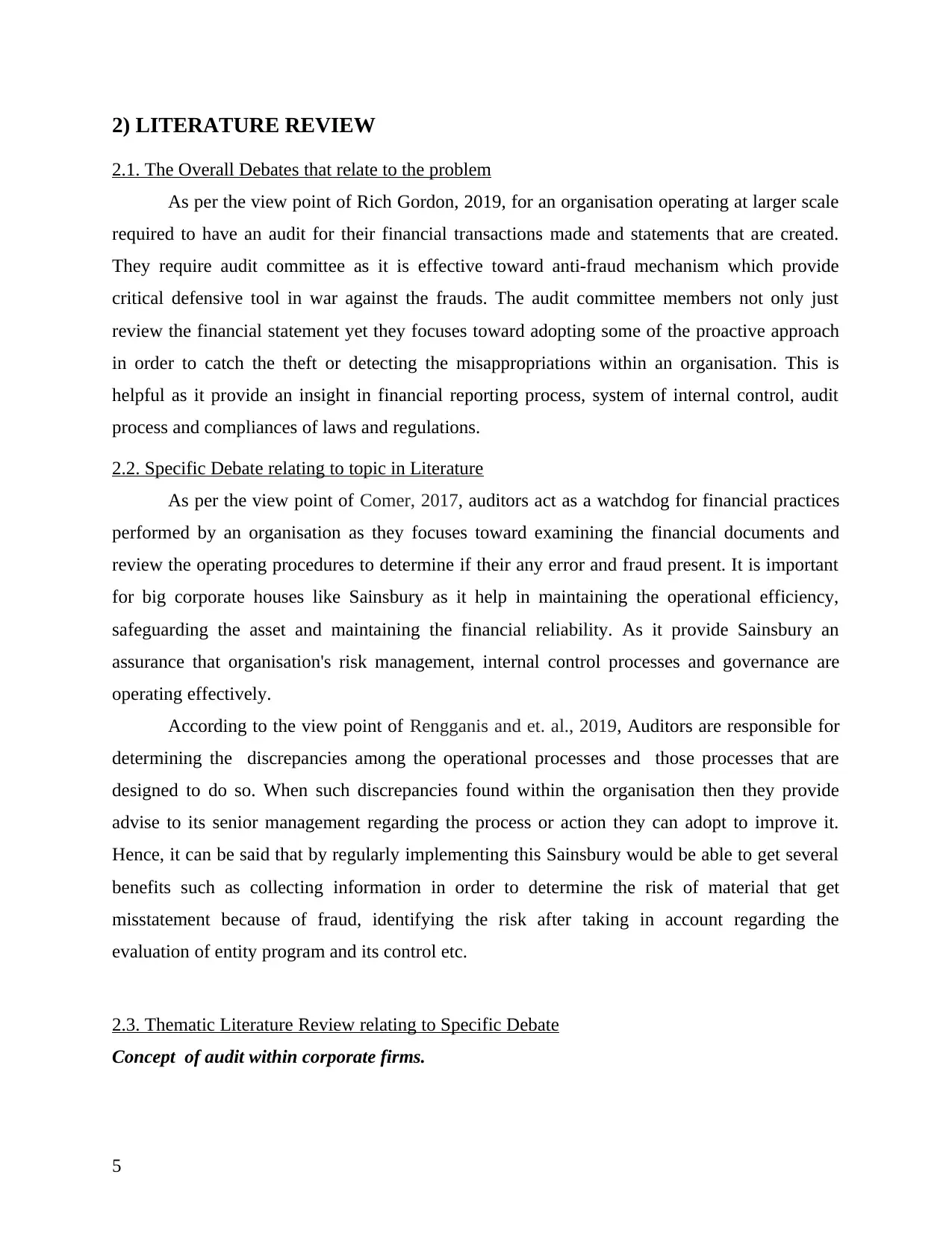
2) LITERATURE REVIEW
2.1. The Overall Debates that relate to the problem
As per the view point of Rich Gordon, 2019, for an organisation operating at larger scale
required to have an audit for their financial transactions made and statements that are created.
They require audit committee as it is effective toward anti-fraud mechanism which provide
critical defensive tool in war against the frauds. The audit committee members not only just
review the financial statement yet they focuses toward adopting some of the proactive approach
in order to catch the theft or detecting the misappropriations within an organisation. This is
helpful as it provide an insight in financial reporting process, system of internal control, audit
process and compliances of laws and regulations.
2.2. Specific Debate relating to topic in Literature
As per the view point of Comer, 2017, auditors act as a watchdog for financial practices
performed by an organisation as they focuses toward examining the financial documents and
review the operating procedures to determine if their any error and fraud present. It is important
for big corporate houses like Sainsbury as it help in maintaining the operational efficiency,
safeguarding the asset and maintaining the financial reliability. As it provide Sainsbury an
assurance that organisation's risk management, internal control processes and governance are
operating effectively.
According to the view point of Rengganis and et. al., 2019, Auditors are responsible for
determining the discrepancies among the operational processes and those processes that are
designed to do so. When such discrepancies found within the organisation then they provide
advise to its senior management regarding the process or action they can adopt to improve it.
Hence, it can be said that by regularly implementing this Sainsbury would be able to get several
benefits such as collecting information in order to determine the risk of material that get
misstatement because of fraud, identifying the risk after taking in account regarding the
evaluation of entity program and its control etc.
2.3. Thematic Literature Review relating to Specific Debate
Concept of audit within corporate firms.
5
2.1. The Overall Debates that relate to the problem
As per the view point of Rich Gordon, 2019, for an organisation operating at larger scale
required to have an audit for their financial transactions made and statements that are created.
They require audit committee as it is effective toward anti-fraud mechanism which provide
critical defensive tool in war against the frauds. The audit committee members not only just
review the financial statement yet they focuses toward adopting some of the proactive approach
in order to catch the theft or detecting the misappropriations within an organisation. This is
helpful as it provide an insight in financial reporting process, system of internal control, audit
process and compliances of laws and regulations.
2.2. Specific Debate relating to topic in Literature
As per the view point of Comer, 2017, auditors act as a watchdog for financial practices
performed by an organisation as they focuses toward examining the financial documents and
review the operating procedures to determine if their any error and fraud present. It is important
for big corporate houses like Sainsbury as it help in maintaining the operational efficiency,
safeguarding the asset and maintaining the financial reliability. As it provide Sainsbury an
assurance that organisation's risk management, internal control processes and governance are
operating effectively.
According to the view point of Rengganis and et. al., 2019, Auditors are responsible for
determining the discrepancies among the operational processes and those processes that are
designed to do so. When such discrepancies found within the organisation then they provide
advise to its senior management regarding the process or action they can adopt to improve it.
Hence, it can be said that by regularly implementing this Sainsbury would be able to get several
benefits such as collecting information in order to determine the risk of material that get
misstatement because of fraud, identifying the risk after taking in account regarding the
evaluation of entity program and its control etc.
2.3. Thematic Literature Review relating to Specific Debate
Concept of audit within corporate firms.
5
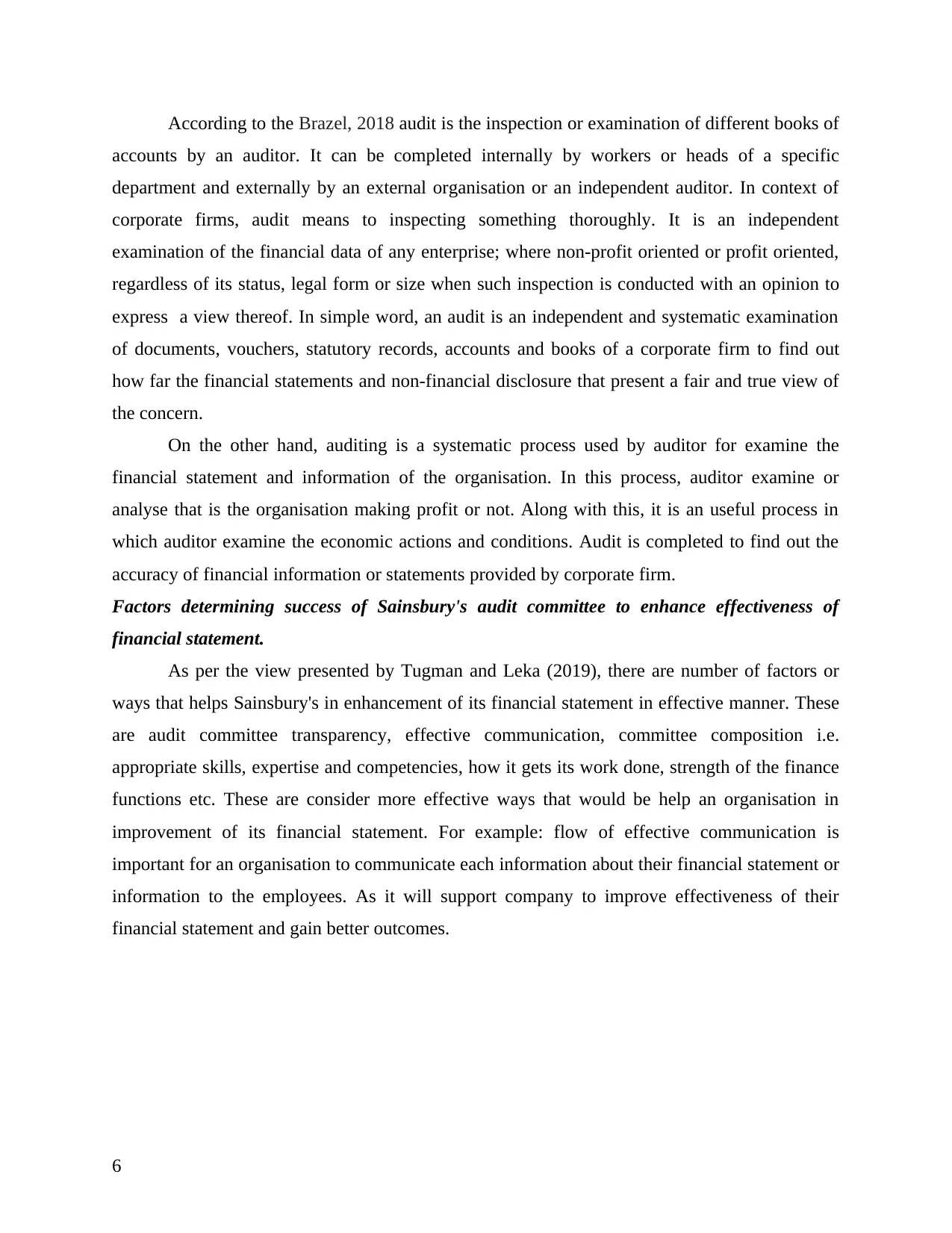
According to the Brazel, 2018 audit is the inspection or examination of different books of
accounts by an auditor. It can be completed internally by workers or heads of a specific
department and externally by an external organisation or an independent auditor. In context of
corporate firms, audit means to inspecting something thoroughly. It is an independent
examination of the financial data of any enterprise; where non-profit oriented or profit oriented,
regardless of its status, legal form or size when such inspection is conducted with an opinion to
express a view thereof. In simple word, an audit is an independent and systematic examination
of documents, vouchers, statutory records, accounts and books of a corporate firm to find out
how far the financial statements and non-financial disclosure that present a fair and true view of
the concern.
On the other hand, auditing is a systematic process used by auditor for examine the
financial statement and information of the organisation. In this process, auditor examine or
analyse that is the organisation making profit or not. Along with this, it is an useful process in
which auditor examine the economic actions and conditions. Audit is completed to find out the
accuracy of financial information or statements provided by corporate firm.
Factors determining success of Sainsbury's audit committee to enhance effectiveness of
financial statement.
As per the view presented by Tugman and Leka (2019), there are number of factors or
ways that helps Sainsbury's in enhancement of its financial statement in effective manner. These
are audit committee transparency, effective communication, committee composition i.e.
appropriate skills, expertise and competencies, how it gets its work done, strength of the finance
functions etc. These are consider more effective ways that would be help an organisation in
improvement of its financial statement. For example: flow of effective communication is
important for an organisation to communicate each information about their financial statement or
information to the employees. As it will support company to improve effectiveness of their
financial statement and gain better outcomes.
6
accounts by an auditor. It can be completed internally by workers or heads of a specific
department and externally by an external organisation or an independent auditor. In context of
corporate firms, audit means to inspecting something thoroughly. It is an independent
examination of the financial data of any enterprise; where non-profit oriented or profit oriented,
regardless of its status, legal form or size when such inspection is conducted with an opinion to
express a view thereof. In simple word, an audit is an independent and systematic examination
of documents, vouchers, statutory records, accounts and books of a corporate firm to find out
how far the financial statements and non-financial disclosure that present a fair and true view of
the concern.
On the other hand, auditing is a systematic process used by auditor for examine the
financial statement and information of the organisation. In this process, auditor examine or
analyse that is the organisation making profit or not. Along with this, it is an useful process in
which auditor examine the economic actions and conditions. Audit is completed to find out the
accuracy of financial information or statements provided by corporate firm.
Factors determining success of Sainsbury's audit committee to enhance effectiveness of
financial statement.
As per the view presented by Tugman and Leka (2019), there are number of factors or
ways that helps Sainsbury's in enhancement of its financial statement in effective manner. These
are audit committee transparency, effective communication, committee composition i.e.
appropriate skills, expertise and competencies, how it gets its work done, strength of the finance
functions etc. These are consider more effective ways that would be help an organisation in
improvement of its financial statement. For example: flow of effective communication is
important for an organisation to communicate each information about their financial statement or
information to the employees. As it will support company to improve effectiveness of their
financial statement and gain better outcomes.
6
⊘ This is a preview!⊘
Do you want full access?
Subscribe today to unlock all pages.

Trusted by 1+ million students worldwide
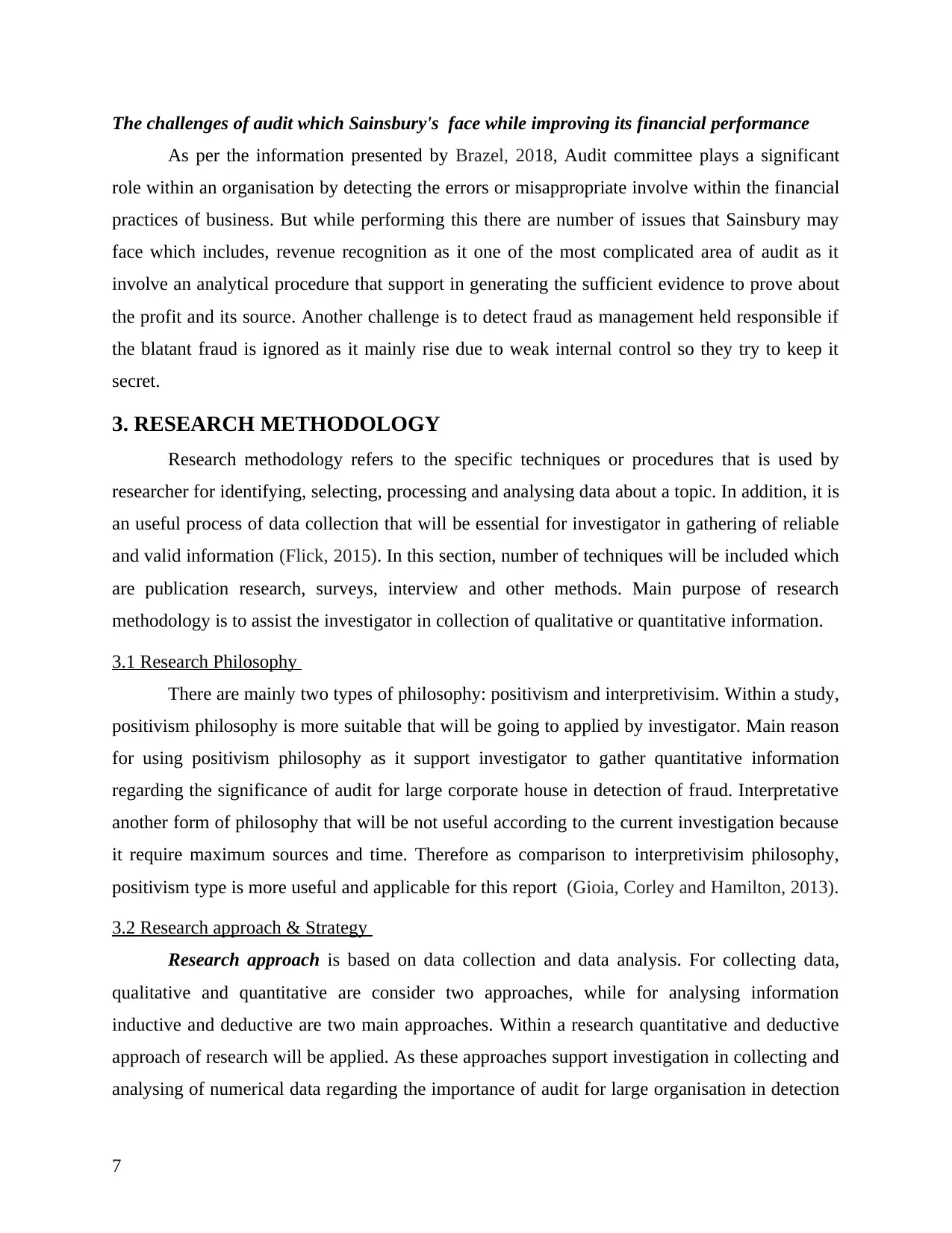
The challenges of audit which Sainsbury's face while improving its financial performance
As per the information presented by Brazel, 2018, Audit committee plays a significant
role within an organisation by detecting the errors or misappropriate involve within the financial
practices of business. But while performing this there are number of issues that Sainsbury may
face which includes, revenue recognition as it one of the most complicated area of audit as it
involve an analytical procedure that support in generating the sufficient evidence to prove about
the profit and its source. Another challenge is to detect fraud as management held responsible if
the blatant fraud is ignored as it mainly rise due to weak internal control so they try to keep it
secret.
3. RESEARCH METHODOLOGY
Research methodology refers to the specific techniques or procedures that is used by
researcher for identifying, selecting, processing and analysing data about a topic. In addition, it is
an useful process of data collection that will be essential for investigator in gathering of reliable
and valid information (Flick, 2015). In this section, number of techniques will be included which
are publication research, surveys, interview and other methods. Main purpose of research
methodology is to assist the investigator in collection of qualitative or quantitative information.
3.1 Research Philosophy
There are mainly two types of philosophy: positivism and interpretivisim. Within a study,
positivism philosophy is more suitable that will be going to applied by investigator. Main reason
for using positivism philosophy as it support investigator to gather quantitative information
regarding the significance of audit for large corporate house in detection of fraud. Interpretative
another form of philosophy that will be not useful according to the current investigation because
it require maximum sources and time. Therefore as comparison to interpretivisim philosophy,
positivism type is more useful and applicable for this report (Gioia, Corley and Hamilton, 2013).
3.2 Research approach & Strategy
Research approach is based on data collection and data analysis. For collecting data,
qualitative and quantitative are consider two approaches, while for analysing information
inductive and deductive are two main approaches. Within a research quantitative and deductive
approach of research will be applied. As these approaches support investigation in collecting and
analysing of numerical data regarding the importance of audit for large organisation in detection
7
As per the information presented by Brazel, 2018, Audit committee plays a significant
role within an organisation by detecting the errors or misappropriate involve within the financial
practices of business. But while performing this there are number of issues that Sainsbury may
face which includes, revenue recognition as it one of the most complicated area of audit as it
involve an analytical procedure that support in generating the sufficient evidence to prove about
the profit and its source. Another challenge is to detect fraud as management held responsible if
the blatant fraud is ignored as it mainly rise due to weak internal control so they try to keep it
secret.
3. RESEARCH METHODOLOGY
Research methodology refers to the specific techniques or procedures that is used by
researcher for identifying, selecting, processing and analysing data about a topic. In addition, it is
an useful process of data collection that will be essential for investigator in gathering of reliable
and valid information (Flick, 2015). In this section, number of techniques will be included which
are publication research, surveys, interview and other methods. Main purpose of research
methodology is to assist the investigator in collection of qualitative or quantitative information.
3.1 Research Philosophy
There are mainly two types of philosophy: positivism and interpretivisim. Within a study,
positivism philosophy is more suitable that will be going to applied by investigator. Main reason
for using positivism philosophy as it support investigator to gather quantitative information
regarding the significance of audit for large corporate house in detection of fraud. Interpretative
another form of philosophy that will be not useful according to the current investigation because
it require maximum sources and time. Therefore as comparison to interpretivisim philosophy,
positivism type is more useful and applicable for this report (Gioia, Corley and Hamilton, 2013).
3.2 Research approach & Strategy
Research approach is based on data collection and data analysis. For collecting data,
qualitative and quantitative are consider two approaches, while for analysing information
inductive and deductive are two main approaches. Within a research quantitative and deductive
approach of research will be applied. As these approaches support investigation in collecting and
analysing of numerical data regarding the importance of audit for large organisation in detection
7
Paraphrase This Document
Need a fresh take? Get an instant paraphrase of this document with our AI Paraphraser
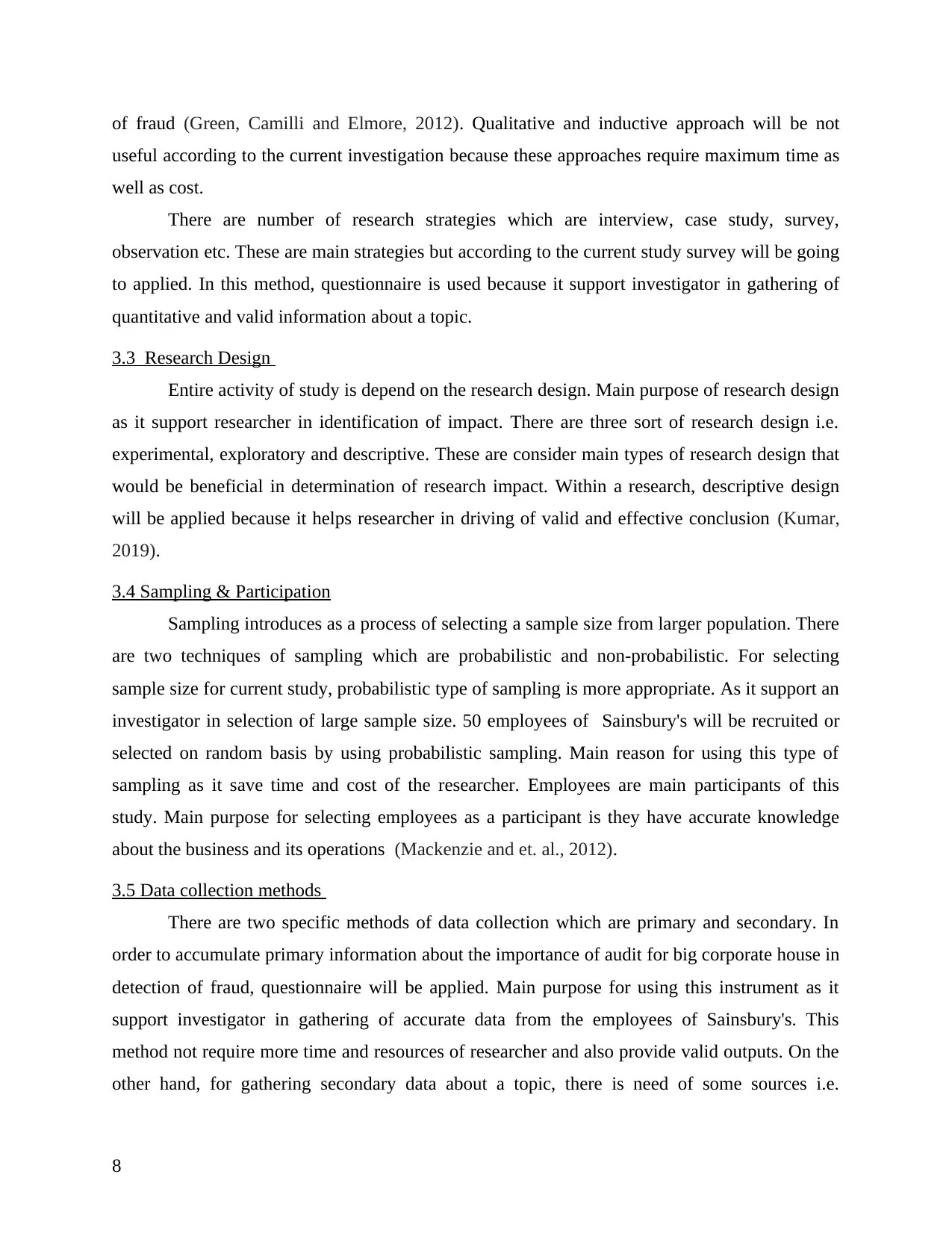
of fraud (Green, Camilli and Elmore, 2012). Qualitative and inductive approach will be not
useful according to the current investigation because these approaches require maximum time as
well as cost.
There are number of research strategies which are interview, case study, survey,
observation etc. These are main strategies but according to the current study survey will be going
to applied. In this method, questionnaire is used because it support investigator in gathering of
quantitative and valid information about a topic.
3.3 Research Design
Entire activity of study is depend on the research design. Main purpose of research design
as it support researcher in identification of impact. There are three sort of research design i.e.
experimental, exploratory and descriptive. These are consider main types of research design that
would be beneficial in determination of research impact. Within a research, descriptive design
will be applied because it helps researcher in driving of valid and effective conclusion (Kumar,
2019).
3.4 Sampling & Participation
Sampling introduces as a process of selecting a sample size from larger population. There
are two techniques of sampling which are probabilistic and non-probabilistic. For selecting
sample size for current study, probabilistic type of sampling is more appropriate. As it support an
investigator in selection of large sample size. 50 employees of Sainsbury's will be recruited or
selected on random basis by using probabilistic sampling. Main reason for using this type of
sampling as it save time and cost of the researcher. Employees are main participants of this
study. Main purpose for selecting employees as a participant is they have accurate knowledge
about the business and its operations (Mackenzie and et. al., 2012).
3.5 Data collection methods
There are two specific methods of data collection which are primary and secondary. In
order to accumulate primary information about the importance of audit for big corporate house in
detection of fraud, questionnaire will be applied. Main purpose for using this instrument as it
support investigator in gathering of accurate data from the employees of Sainsbury's. This
method not require more time and resources of researcher and also provide valid outputs. On the
other hand, for gathering secondary data about a topic, there is need of some sources i.e.
8
useful according to the current investigation because these approaches require maximum time as
well as cost.
There are number of research strategies which are interview, case study, survey,
observation etc. These are main strategies but according to the current study survey will be going
to applied. In this method, questionnaire is used because it support investigator in gathering of
quantitative and valid information about a topic.
3.3 Research Design
Entire activity of study is depend on the research design. Main purpose of research design
as it support researcher in identification of impact. There are three sort of research design i.e.
experimental, exploratory and descriptive. These are consider main types of research design that
would be beneficial in determination of research impact. Within a research, descriptive design
will be applied because it helps researcher in driving of valid and effective conclusion (Kumar,
2019).
3.4 Sampling & Participation
Sampling introduces as a process of selecting a sample size from larger population. There
are two techniques of sampling which are probabilistic and non-probabilistic. For selecting
sample size for current study, probabilistic type of sampling is more appropriate. As it support an
investigator in selection of large sample size. 50 employees of Sainsbury's will be recruited or
selected on random basis by using probabilistic sampling. Main reason for using this type of
sampling as it save time and cost of the researcher. Employees are main participants of this
study. Main purpose for selecting employees as a participant is they have accurate knowledge
about the business and its operations (Mackenzie and et. al., 2012).
3.5 Data collection methods
There are two specific methods of data collection which are primary and secondary. In
order to accumulate primary information about the importance of audit for big corporate house in
detection of fraud, questionnaire will be applied. Main purpose for using this instrument as it
support investigator in gathering of accurate data from the employees of Sainsbury's. This
method not require more time and resources of researcher and also provide valid outputs. On the
other hand, for gathering secondary data about a topic, there is need of some sources i.e.
8
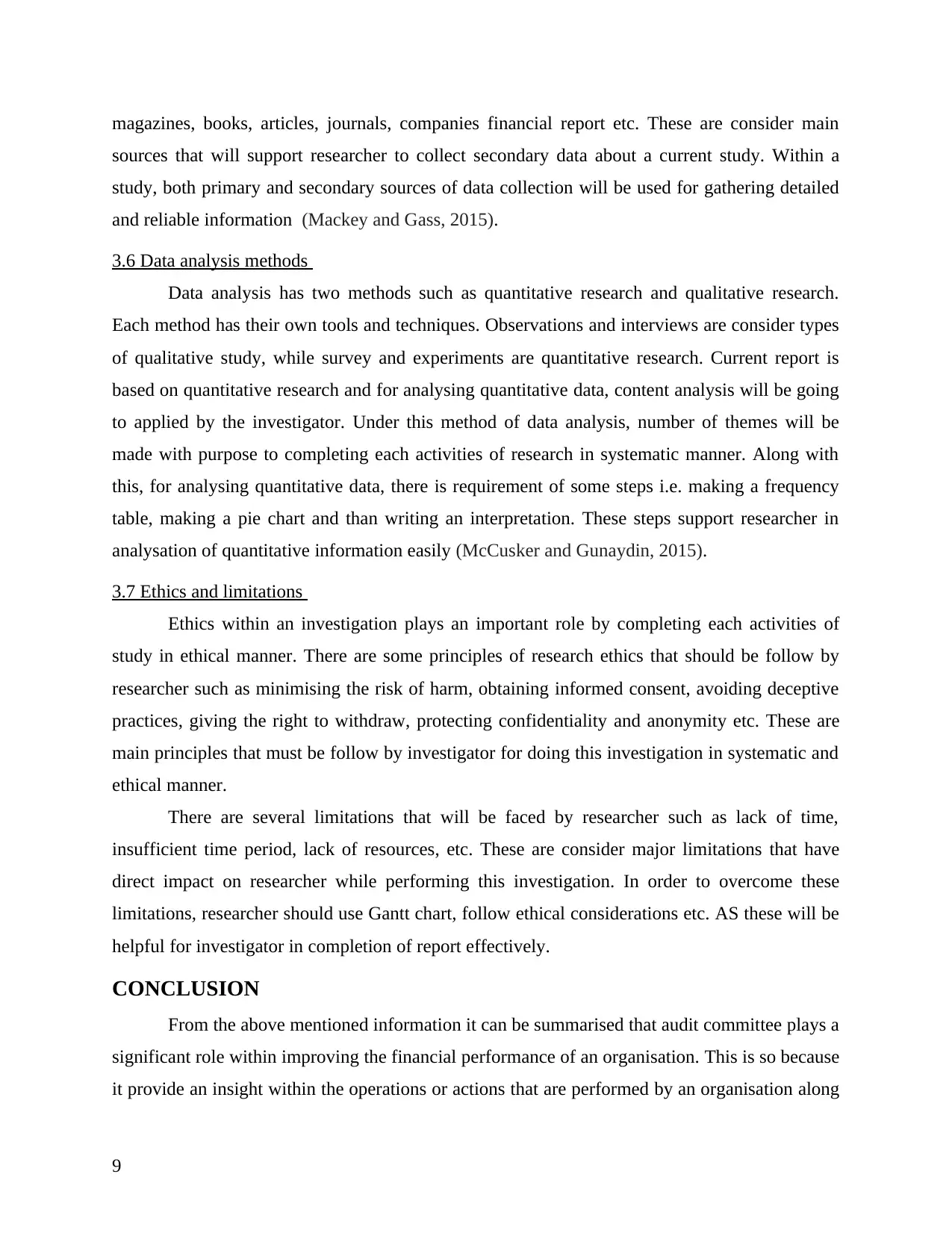
magazines, books, articles, journals, companies financial report etc. These are consider main
sources that will support researcher to collect secondary data about a current study. Within a
study, both primary and secondary sources of data collection will be used for gathering detailed
and reliable information (Mackey and Gass, 2015).
3.6 Data analysis methods
Data analysis has two methods such as quantitative research and qualitative research.
Each method has their own tools and techniques. Observations and interviews are consider types
of qualitative study, while survey and experiments are quantitative research. Current report is
based on quantitative research and for analysing quantitative data, content analysis will be going
to applied by the investigator. Under this method of data analysis, number of themes will be
made with purpose to completing each activities of research in systematic manner. Along with
this, for analysing quantitative data, there is requirement of some steps i.e. making a frequency
table, making a pie chart and than writing an interpretation. These steps support researcher in
analysation of quantitative information easily (McCusker and Gunaydin, 2015).
3.7 Ethics and limitations
Ethics within an investigation plays an important role by completing each activities of
study in ethical manner. There are some principles of research ethics that should be follow by
researcher such as minimising the risk of harm, obtaining informed consent, avoiding deceptive
practices, giving the right to withdraw, protecting confidentiality and anonymity etc. These are
main principles that must be follow by investigator for doing this investigation in systematic and
ethical manner.
There are several limitations that will be faced by researcher such as lack of time,
insufficient time period, lack of resources, etc. These are consider major limitations that have
direct impact on researcher while performing this investigation. In order to overcome these
limitations, researcher should use Gantt chart, follow ethical considerations etc. AS these will be
helpful for investigator in completion of report effectively.
CONCLUSION
From the above mentioned information it can be summarised that audit committee plays a
significant role within improving the financial performance of an organisation. This is so because
it provide an insight within the operations or actions that are performed by an organisation along
9
sources that will support researcher to collect secondary data about a current study. Within a
study, both primary and secondary sources of data collection will be used for gathering detailed
and reliable information (Mackey and Gass, 2015).
3.6 Data analysis methods
Data analysis has two methods such as quantitative research and qualitative research.
Each method has their own tools and techniques. Observations and interviews are consider types
of qualitative study, while survey and experiments are quantitative research. Current report is
based on quantitative research and for analysing quantitative data, content analysis will be going
to applied by the investigator. Under this method of data analysis, number of themes will be
made with purpose to completing each activities of research in systematic manner. Along with
this, for analysing quantitative data, there is requirement of some steps i.e. making a frequency
table, making a pie chart and than writing an interpretation. These steps support researcher in
analysation of quantitative information easily (McCusker and Gunaydin, 2015).
3.7 Ethics and limitations
Ethics within an investigation plays an important role by completing each activities of
study in ethical manner. There are some principles of research ethics that should be follow by
researcher such as minimising the risk of harm, obtaining informed consent, avoiding deceptive
practices, giving the right to withdraw, protecting confidentiality and anonymity etc. These are
main principles that must be follow by investigator for doing this investigation in systematic and
ethical manner.
There are several limitations that will be faced by researcher such as lack of time,
insufficient time period, lack of resources, etc. These are consider major limitations that have
direct impact on researcher while performing this investigation. In order to overcome these
limitations, researcher should use Gantt chart, follow ethical considerations etc. AS these will be
helpful for investigator in completion of report effectively.
CONCLUSION
From the above mentioned information it can be summarised that audit committee plays a
significant role within improving the financial performance of an organisation. This is so because
it provide an insight within the operations or actions that are performed by an organisation along
9
⊘ This is a preview!⊘
Do you want full access?
Subscribe today to unlock all pages.

Trusted by 1+ million students worldwide
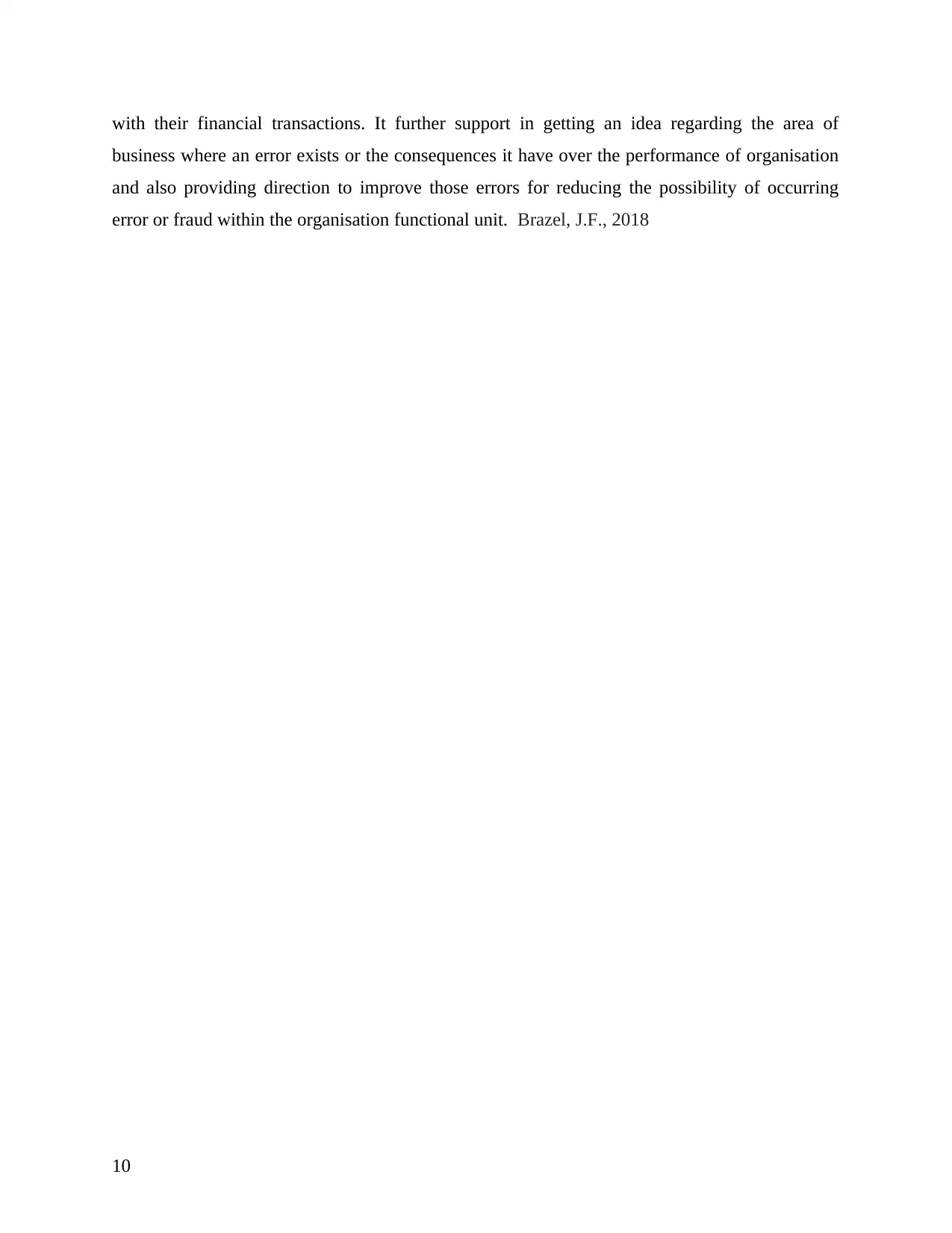
with their financial transactions. It further support in getting an idea regarding the area of
business where an error exists or the consequences it have over the performance of organisation
and also providing direction to improve those errors for reducing the possibility of occurring
error or fraud within the organisation functional unit. Brazel, J.F., 2018
10
business where an error exists or the consequences it have over the performance of organisation
and also providing direction to improve those errors for reducing the possibility of occurring
error or fraud within the organisation functional unit. Brazel, J.F., 2018
10
Paraphrase This Document
Need a fresh take? Get an instant paraphrase of this document with our AI Paraphraser
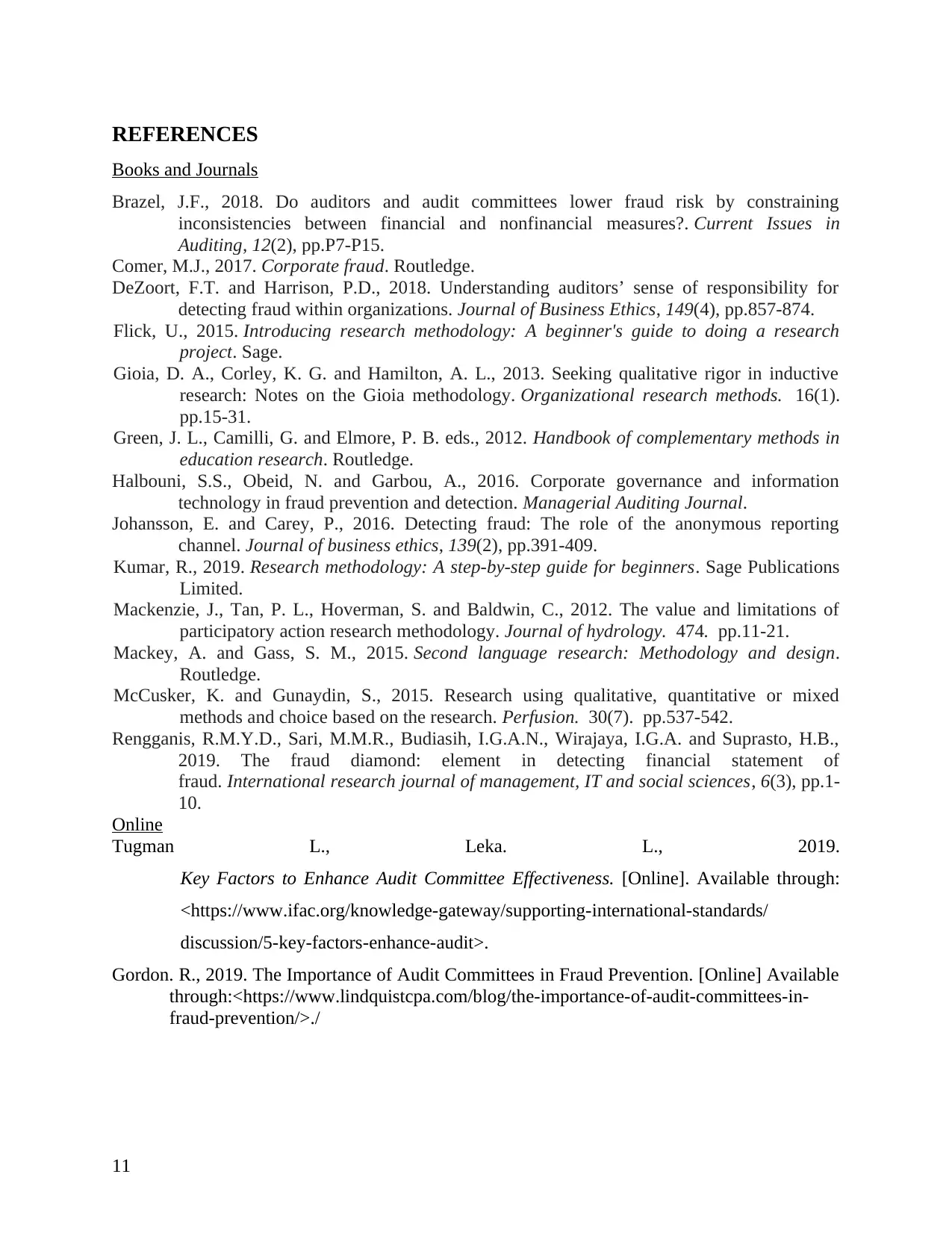
REFERENCES
Books and Journals
Brazel, J.F., 2018. Do auditors and audit committees lower fraud risk by constraining
inconsistencies between financial and nonfinancial measures?. Current Issues in
Auditing, 12(2), pp.P7-P15.
Comer, M.J., 2017. Corporate fraud. Routledge.
DeZoort, F.T. and Harrison, P.D., 2018. Understanding auditors’ sense of responsibility for
detecting fraud within organizations. Journal of Business Ethics, 149(4), pp.857-874.
Flick, U., 2015. Introducing research methodology: A beginner's guide to doing a research
project. Sage.
Gioia, D. A., Corley, K. G. and Hamilton, A. L., 2013. Seeking qualitative rigor in inductive
research: Notes on the Gioia methodology. Organizational research methods. 16(1).
pp.15-31.
Green, J. L., Camilli, G. and Elmore, P. B. eds., 2012. Handbook of complementary methods in
education research. Routledge.
Halbouni, S.S., Obeid, N. and Garbou, A., 2016. Corporate governance and information
technology in fraud prevention and detection. Managerial Auditing Journal.
Johansson, E. and Carey, P., 2016. Detecting fraud: The role of the anonymous reporting
channel. Journal of business ethics, 139(2), pp.391-409.
Kumar, R., 2019. Research methodology: A step-by-step guide for beginners. Sage Publications
Limited.
Mackenzie, J., Tan, P. L., Hoverman, S. and Baldwin, C., 2012. The value and limitations of
participatory action research methodology. Journal of hydrology. 474. pp.11-21.
Mackey, A. and Gass, S. M., 2015. Second language research: Methodology and design.
Routledge.
McCusker, K. and Gunaydin, S., 2015. Research using qualitative, quantitative or mixed
methods and choice based on the research. Perfusion. 30(7). pp.537-542.
Rengganis, R.M.Y.D., Sari, M.M.R., Budiasih, I.G.A.N., Wirajaya, I.G.A. and Suprasto, H.B.,
2019. The fraud diamond: element in detecting financial statement of
fraud. International research journal of management, IT and social sciences, 6(3), pp.1-
10.
Online
Tugman L., Leka. L., 2019.
Key Factors to Enhance Audit Committee Effectiveness. [Online]. Available through:
<https://www.ifac.org/knowledge-gateway/supporting-international-standards/
discussion/5-key-factors-enhance-audit>.
Gordon. R., 2019. The Importance of Audit Committees in Fraud Prevention. [Online] Available
through:<https://www.lindquistcpa.com/blog/the-importance-of-audit-committees-in-
fraud-prevention/>./
11
Books and Journals
Brazel, J.F., 2018. Do auditors and audit committees lower fraud risk by constraining
inconsistencies between financial and nonfinancial measures?. Current Issues in
Auditing, 12(2), pp.P7-P15.
Comer, M.J., 2017. Corporate fraud. Routledge.
DeZoort, F.T. and Harrison, P.D., 2018. Understanding auditors’ sense of responsibility for
detecting fraud within organizations. Journal of Business Ethics, 149(4), pp.857-874.
Flick, U., 2015. Introducing research methodology: A beginner's guide to doing a research
project. Sage.
Gioia, D. A., Corley, K. G. and Hamilton, A. L., 2013. Seeking qualitative rigor in inductive
research: Notes on the Gioia methodology. Organizational research methods. 16(1).
pp.15-31.
Green, J. L., Camilli, G. and Elmore, P. B. eds., 2012. Handbook of complementary methods in
education research. Routledge.
Halbouni, S.S., Obeid, N. and Garbou, A., 2016. Corporate governance and information
technology in fraud prevention and detection. Managerial Auditing Journal.
Johansson, E. and Carey, P., 2016. Detecting fraud: The role of the anonymous reporting
channel. Journal of business ethics, 139(2), pp.391-409.
Kumar, R., 2019. Research methodology: A step-by-step guide for beginners. Sage Publications
Limited.
Mackenzie, J., Tan, P. L., Hoverman, S. and Baldwin, C., 2012. The value and limitations of
participatory action research methodology. Journal of hydrology. 474. pp.11-21.
Mackey, A. and Gass, S. M., 2015. Second language research: Methodology and design.
Routledge.
McCusker, K. and Gunaydin, S., 2015. Research using qualitative, quantitative or mixed
methods and choice based on the research. Perfusion. 30(7). pp.537-542.
Rengganis, R.M.Y.D., Sari, M.M.R., Budiasih, I.G.A.N., Wirajaya, I.G.A. and Suprasto, H.B.,
2019. The fraud diamond: element in detecting financial statement of
fraud. International research journal of management, IT and social sciences, 6(3), pp.1-
10.
Online
Tugman L., Leka. L., 2019.
Key Factors to Enhance Audit Committee Effectiveness. [Online]. Available through:
<https://www.ifac.org/knowledge-gateway/supporting-international-standards/
discussion/5-key-factors-enhance-audit>.
Gordon. R., 2019. The Importance of Audit Committees in Fraud Prevention. [Online] Available
through:<https://www.lindquistcpa.com/blog/the-importance-of-audit-committees-in-
fraud-prevention/>./
11
1 out of 11
Related Documents
Your All-in-One AI-Powered Toolkit for Academic Success.
+13062052269
info@desklib.com
Available 24*7 on WhatsApp / Email
![[object Object]](/_next/static/media/star-bottom.7253800d.svg)
Unlock your academic potential
Copyright © 2020–2026 A2Z Services. All Rights Reserved. Developed and managed by ZUCOL.





